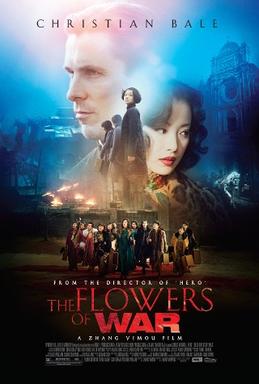
The Flowers of War
The Flowers of War (Chinese: 金陵十三钗, Pinyin: Jīnlíng Shísān Chāi ) is a 2011 Chinese-Hong Kong historical drama war film directed by Zhang Yimou, starring Christian Bale, Ni Ni, Zhang Xinyi, Tong Dawei, Atsuro Watabe, Shigeo Kobayashi and Cao Kefan.[1][2][3] The film is based on a novella by Geling Yan, 13 Flowers of Nanjing, inspired by the diary of Minnie Vautrin.[4] The story is set in Nanjing, China, during the 1937 Nanjing Massacre in the Second Sino-Japanese War. A group of escapees, finding sanctuary in a church compound, try to survive the Japanese atrocities.[5][6]
The Flowers of War
金陵十三釵
金陵十三钗
Thirteen Hairpins of Jinling
Jīnlíng shísān chāi
13 Flowers of Nanjing
by Geling Yan
William Kong
David Linde
Zhang Weiping
Zhang Yimou
Brandt Andersen
Peicong Meng
EDKO Film
Wrekin Hill Entertainment
Row 1 Productions
- December 16, 2011 (China)
146 minutes
China
Mandarin
Cantonese
English
Japanese
$94 million
$98.2 million
It was selected as the Chinese entry for Best Foreign Language Film at the 84th Academy Awards,[7][8][9] but did not make the final shortlist.[10] It also received a nomination for the 69th Golden Globe Awards.[11] The 6th Asian Film Awards presented The Flowers of War with several individual nominations, including Best Film.[12][13] The film's North American distribution rights were acquired by Wrekin Hill Entertainment, in association with Row 1 Productions, leading to an Oscar-qualifying limited release in New York, Los Angeles and San Francisco in late December 2011, with general release in January 2012.[14][15][16]
The Flowers of War received mixed reviews from critics and was a box office bomb, grossing only $98 million against a $94 million budget.[17]
Plot[edit]
In 1937, Japan invades China, beginning the Second Sino-Japanese War. The Imperial Japanese Army overruns China's capital city, Nanjing, in December and carries out the Nanjing massacre. As the Japanese overrun the Chinese army, desperate schoolgirls flee to the sanctuary of their convent at a Western-run Roman Catholic cathedral. John Miller, an American mortician on a job to bury the head priest, joins the group of innocent schoolgirls. He finds George, an orphan boy who was raised by the dead priest and taught English. Soon a group of flamboyant prostitutes arrive at the cathedral, seeking refuge by hiding in the cellar. Pretending to be a priest, Miller tries to keep everyone safe while repairing the convent's truck to escape.
After an incident when rogue Japanese forces assault the cathedral (who are then killed by the dying effort of a lone Chinese Major), Japanese Colonel Hasegawa promises to protect the convent by placing guards outside the gate and requests that the schoolgirls sing a chorale for him. Several days later, he hands Miller an official invitation for the schoolgirls to sing at the Japanese Army's victory celebration. Fearing for the safety of the virginal schoolgirls, Miller declines. Hasegawa informs him that it is an order and that the girls are going to be picked up the next day. Before they leave, the Japanese soldiers count the schoolgirls and erroneously include one of the prostitutes (who has strayed from the cellar), totalling 13.
When the de facto leader of the schoolgirls, Shu Juan, convinces them that they are better off committing suicide by jumping off the cathedral tower, they are saved at the last moment when the de facto leader of the prostitutes, Yu Mo, convinces her group to protect the schoolgirls by taking their place at the Japanese party. As there are only 12 prostitutes, George, the dead priest's adoptive son, volunteers as well. Miller initially opposes their self-sacrificial decision but relents and assists in disguising them, using his skills as a mortician to adjust their makeup and cut their hair to appear like schoolgirls. The prostitutes also create knives out of broken windows and hide them in their cloaks.
The next day, the "13 Flowers of Nanjing" are led away by the unsuspecting Japanese soldiers. After they depart, Miller hides the schoolgirls on the truck he repaired and using a single-person permit provided by the father of a schoolgirl, drives out of Nanjing. In the last scene, the truck is seen driving on a deserted highway heading west, away from the Japanese army. The fate of the 13 Flowers remains unknown, apparently martyring themselves for the schoolgirls' freedom.
Marketing[edit]
On September 9, 2011, the film was retitled The Flowers of War, after a 20-minute screening for prominent U.S. film distributors and the media at the Toronto International Film Festival.[27] Zhang stated that the story in The Flowers of War differs from many other Chinese films on this subject as it is told from the perspectives of women.[28] In October 2011, the first trailer was released, making way for an American trailer to be revealed.[29][30][31][32]